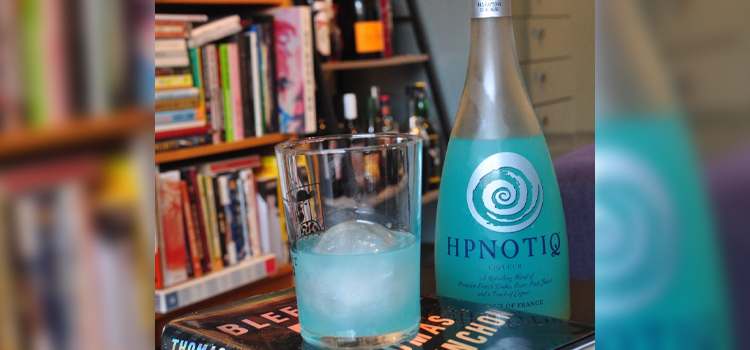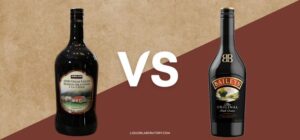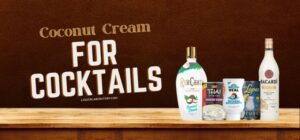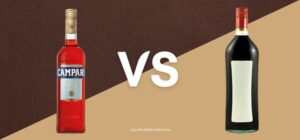Last Updated on April 6, 2024 by Lydia Martin
Hpnotiq, pronounced as “Hypnotic,” can be the magic elixir in the alcohol world. Its sky-blue liqueur mix of ultra-premium French vodka, cognac, and fruit juices gives fun vibes and entertainment.
But you might probably wonder about its shelf life and how to store it properly. Does Hpnotiq need to be refrigerated? Read on to find out.
Table of Contents
ToggleDoes Hpnotiq Require Refrigeration?

No, Hpnotiq doesn’t require refrigeration because it’s a shelf-tough product. Hpnotiq undergoes traditional preservation processes that you can safely store in a room-temperature pantry.
This genius idea was inspired by a blue perfume bottle and was created in 2001 by a college dropout named Raphael Yakoby in New York.
It is made in the Cognac region of France but is being distributed by Heaven Hill Distilleries Inc after purchasing its distribution rights. [1]
Read: Popular Hpnotiq Recipes
Why You Don’t Need To Refrigerate It

Opened
Hpnotiq doesn’t require refrigeration after opening and can still be stored on a pantry shelf.
However, an alcoholic beverage with added flavors, such as spices, herbs, and fruits, might lose its flavor & fragrance after a few months, usually 6 months or so.
Unopened

Hpnotiq and French sparkling liqueur can be stored at room temperature when unopened.
But while liquors have an indefinite shelf life, liqueurs may lose their flavors after several months.
What Happens When It’s Refrigerated?
Hpnotiq does not freeze when refrigerated, just like the Nuvo sparkling liqueur. It contains vodka, a distilled spirit that prevents it from freezing. Its high sugar content also prevents it from doing so.
Also Read:
Hpnotiq’s Shelf Life

Unlike hard liquors, liqueurs like Hpnotiq (even unopened bottles) can spoil and become undrinkable after a year or so.
After opening Hpnotiq, its shelf life will also decrease, and it is recommended to consume it within 6 to 8 months. Most liqueurs should last a year or longer, depending on the added preservatives.
Does Hpnotiq Go Bad?
Like most liqueurs, Hpnotiq will eventually go bad because these beverages contain ingredients that can spoil. Hpnotiq contains fruit juice that can degrade over time.
A good rule of thumb when it comes to the shelf life of liqueurs is to check whether there’s any discoloration, crystallization, or curdling in the bottle.
If there is, throw the bottle away. We also recommend doing a smell and taste test before drinking any liqueur all the way.
How Does Hpnotiq Taste When Refrigerated?
Hpnotiq will taste the same even if it’s refrigerated, it will become cold, but it won’t freeze.
You will taste a great fusion of exotic fruit flavors, charcoal-filtered vodka, and cognac, which reveals bright citrus notes that could completely overpower the slightly bitter edge.
Frequently Asked Questions (FAQs)
How long does Hypnotic last?
Hypnotic, also known as Hpnotiq, is a distinctive liqueur renowned for its captivating blue hue and exotic fruit flavors. One common inquiry among enthusiasts is the shelf life of this vibrant liqueur once it’s been opened.
Hypnotic’s longevity post-opening largely hinges on the manner of storage and the presence of other ingredients. Like many liqueurs, Hypnotic boasts a shelf life extended by its high sugar and alcohol content, acting as natural preservatives.
When stored properly—typically in a cool, dark place, shielded from direct sunlight and excessive heat—an opened bottle of Hypnotic can retain its quality for several years without significant degradation.
However, it’s prudent to remain vigilant for any signs of spoilage before indulging in Hypnotic that has been stored for an extended period. Subtle changes in color, aroma, or taste may indicate the onset of deterioration. Nonetheless, under optimal storage conditions, Hypnotic can maintain its allure and flavor profile for an extended duration.
Can you drink Hypnotic straight?
The versatility of Hypnotic extends beyond its role as a mixer in cocktails—it can also be enjoyed neat or on the rocks, providing a standalone experience brimming with tropical allure. The decision to savor Hypnotic straight or incorporate it into cocktails is ultimately a matter of personal preference and taste.
While Hypnotic’s sweet and fruity character makes it a popular choice for mixing, its flavor profile also lends itself well to solo consumption. Sipping Hypnotic neat allows enthusiasts to appreciate its intricate blend of tropical fruit essences, including hints of passion fruit and mango, intertwined with a subtle cognac undertone. However, it’s worth noting that Hypnotic’s pronounced sweetness may appeal more to those with a penchant for sweeter libations.
Regardless of how one chooses to indulge in Hypnotic, moderation remains key. Whether enjoyed straight, on the rocks, or as part of a meticulously crafted cocktail, savoring Hypnotic responsibly ensures an enjoyable and memorable experience.
What liquor needs to be refrigerated?
While many liquors are content to rest comfortably at room temperature, certain varieties benefit from refrigeration to uphold their flavor integrity and prolong their shelf life. Among these liquors are:
Cream-based liqueurs: Rich and indulgent, cream-based liqueurs like Irish cream liqueur warrant refrigeration post-opening to stave off spoilage and separation. The dairy content renders them particularly susceptible to degradation at room temperature.
Fruit liqueurs: Liqueurs infused with the essence of fruits, especially those boasting higher sugar concentrations, thrive under refrigeration to retain their freshness and thwart crystallization. This category encompasses fruit schnapps and berry liqueurs, among others.
Vermouth: Both sweet and dry vermouth varieties are best kept chilled after opening to preserve their nuanced flavor profiles. Vermouth’s botanicals and aromatics are prone to degradation when exposed to heat and light, underscoring the importance of refrigeration.
Certain herbal liqueurs: Herbal liqueurs such as chartreuse and Benedictine, revered for their complex botanical profiles, often benefit from refrigeration to safeguard their herbal nuances and prevent oxidation.
Homemade infusions: DIY enthusiasts crafting homemade infused spirits using fresh ingredients like fruits, herbs, or spices should refrigerate their concoctions to safeguard their flavors and ward off spoilage.
While refrigeration serves as a safeguard for certain liquors, it’s paramount to store all alcoholic beverages away from direct sunlight, heat sources, and temperature fluctuations to uphold their quality over time. By adhering to proper storage practices, enthusiasts can ensure their favorite libations remain as enticing and flavorful as the day they were acquired.
Do you need to refrigerate coffee liqueur?
Coffee liqueur, such as the renowned Kahlúa or Tia Maria, is a delectable fusion of rich coffee flavors and sweet liqueur, making it a favorite among many cocktail enthusiasts. Whether it’s sipped straight, used as a key ingredient in cocktails like White Russians, or drizzled over desserts, coffee liqueur offers a versatile and indulgent experience.
While the question of refrigerating coffee liqueur often arises, the general consensus is that it is not strictly necessary. Coffee liqueurs typically boast a high sugar content and are crafted with distilled spirits, both of which act as natural preservatives, allowing them to maintain stability at room temperature for extended periods. Consequently, storing coffee liqueur in a cool, dark place away from direct sunlight and heat sources suffices for most brands.
However, while refrigeration won’t harm coffee liqueur, it may cause certain varieties to thicken or develop sediment over time. Despite these cosmetic changes, the liqueur’s flavor and quality remain largely unaffected. Therefore, while refrigeration is not mandatory, maintaining proper storage conditions can help ensure the longevity and optimal enjoyment of your coffee liqueur.
What is the purpose of Hypnotic?
Hypnotic, known for its mesmerizing blue hue and tropical fruit-infused flavor profile, serves a multitude of purposes in the world of mixology and enjoyment. This captivating liqueur combines the essence of exotic fruits like passion fruit and mango with a subtle undertone of cognac, resulting in a uniquely vibrant and refreshing taste.
One of the primary roles of Hypnotic is its versatility as a cocktail ingredient. Its sweet and fruity character makes it a sought-after addition to a wide array of cocktails, adding both flavor and visual appeal. Whether it’s mixed with vodka, rum, or champagne, Hypnotic lends a tropical twist to cocktails, making them as visually stunning as they are deliciously flavorful.
Beyond its role as a mixer, Hypnotic can also be enjoyed on its own, providing a delightful standalone drinking experience. Sipped neat or over ice, Hypnotic allows enthusiasts to fully appreciate its intricate blend of tropical fruit flavors and subtle cognac notes. Its vibrant blue color adds to its allure, making it a visually striking addition to any gathering or occasion.
In essence, the purpose of Hypnotic is to elevate the drinking experience, whether as a key ingredient in cocktails or as a standalone indulgence. Its unique flavor profile and striking appearance make it a favorite choice for those seeking a taste of the tropics and a touch of sophistication in their libations.
Does Hypnotic taste good?
The taste of Hypnotic is subjective, but for many, it’s undeniably delicious and enjoyable. Hypnotic’s flavor profile is characterized by its sweet and fruity notes, reminiscent of tropical fruits like passion fruit and mango, complemented by a subtle hint of cognac. This unique combination of flavors creates a refreshing and indulgent taste that appeals to a wide range of palates.
Additionally, Hypnotic’s vibrant blue color adds to its appeal, making it visually striking in cocktails and drinks. Whether mixed into cocktails or enjoyed on its own, Hypnotic is often lauded for its ability to add a touch of tropical allure to any drinking experience.
Overall, for those who appreciate sweet and fruity liqueurs, Hypnotic is frequently regarded as tasting quite good and is a popular choice for mixing cocktails or savoring on its own. Its versatility and distinctive flavor profile make it a beloved addition to any bar or liquor cabinet.
Is hypnotic liquor or wine?
Hypnotic is neither a liquor nor wine; it’s actually a liqueur. When it comes to categorizing alcoholic beverages, it’s crucial to understand the distinctions. Liquor typically refers to distilled alcoholic beverages such as vodka, whiskey, rum, and gin.
On the other hand, wine is made through the fermentation of fruit juices, usually grapes. Liqueurs, like Hypnotic, fall into a separate category altogether. Liqueurs are alcoholic beverages made from distilled spirits and flavored with various ingredients such as fruits, herbs, spices, flowers, or nuts.
These flavorings can range from citrus peels and botanicals to nuts, creams, and even chocolate. What sets liqueurs apart is their sweet and often intense flavors, making them a popular choice for adding depth and complexity to cocktails or enjoying on their own as a digestif.
What type of liquor is hypnotic?
Hypnotic is specifically classified as a liqueur. Understanding what constitutes a liqueur is fundamental to appreciating Hypnotic and similar spirits. Liqueurs are distinct from liquors due to their flavoring and sweetening agents. They are typically sweeter and lower in alcohol content compared to hard liquors.
The process of making liqueurs involves infusing or distilling fruits, herbs, spices, or other flavorings into a base spirit, which can be made from various grains, sugarcane, or other fermented substances. In the case of Hypnotic, its signature blend of tropical fruit flavors is achieved through a carefully crafted infusion process, resulting in its vibrant blue hue and distinctive taste profile.
Is hypnotic a light liquor?
Yes, Hypnotic liqueur is considered a lighter spirit compared to hard liquors such as vodka, whiskey, or rum. This distinction primarily arises from its alcohol content. Lighter spirits typically have lower alcohol by volume (ABV) percentages, making them less potent than their higher-proof counterparts.
Hypnotic liqueur typically ranges from 15% to 30% ABV, placing it on the lower end of the alcohol strength spectrum. However, it’s essential to recognize that even though it may be lighter in terms of alcohol content, Hypnotic still contains alcohol and should be consumed responsibly.
Despite its lighter nature, Hypnotic liqueur offers a flavorful and versatile drinking experience. Its sweet and fruity taste profile, combined with its vibrant blue color, makes it a popular choice for cocktails and mixed drinks. Whether enjoyed on its own, over ice, or as an ingredient in cocktails such as the Hypnotic Martini or Blue Breeze, Hypnotic liqueur adds a colorful and aromatic twist to any beverage. However, it’s always advisable to enjoy alcoholic beverages in moderation and to be mindful of their alcohol content.
Will alcohol go bad if not refrigerated?
Alcohol, particularly distilled spirits like vodka, whiskey, rum, and gin, typically does not go bad if not refrigerated. This is due to its high alcohol content, which acts as a preservative, inhibiting the growth of bacteria and other microorganisms that cause food and beverages to spoil.
However, some factors can affect the quality of alcohol over time, such as exposure to sunlight, extreme temperatures, and changes in humidity. While refrigeration can slow down these processes and help maintain the flavor and aroma of certain types of alcohol, it’s not always necessary for preserving its shelf life.
What happens to alcohol if not refrigerated?
When alcohol is not refrigerated, it remains safe to consume for an extended period due to its high alcohol content, which acts as a preservative. However, certain environmental factors can affect its taste, aroma, and overall quality over time. Exposure to sunlight, for example, can cause chemical reactions that alter the flavor and color of alcohol.
This is particularly true for beverages like beer and wine, which are more susceptible to light damage due to their lower alcohol content and specific compounds present in the liquid.
Extreme temperatures and fluctuations in humidity can also impact the integrity of alcohol, causing it to evaporate or degrade more quickly. While refrigeration can help mitigate these effects, properly storing alcohol in a cool, dark place away from direct sunlight and heat sources is usually sufficient to maintain its quality over time.
Can alcohol be stored unrefrigerated?
Yes, alcohol can generally be stored unrefrigerated without significant deterioration in quality, especially in the case of distilled spirits like vodka, whiskey, rum, and gin. These spirits have high alcohol content, which acts as a natural preservative, inhibiting the growth of bacteria and other microorganisms that cause spoilage.
However, certain types of alcohol, such as wine, beer, and some liqueurs, may benefit from refrigeration or other storage conditions to maintain their freshness and flavor. Wine, for instance, is susceptible to heat and light damage, which can accelerate the aging process and negatively impact its taste. Similarly, beer can undergo chemical changes when exposed to light, resulting in off-flavors and aromas.
Ultimately, the best storage method for alcohol depends on its type and specific characteristics. Following the storage recommendations provided by manufacturers and using common sense when storing alcohol can help ensure its optimal preservation and enjoyment.
So, Does Hpnotiq Need to Be Refrigerated?
Hpnotiq, commonly known as Hpnotiq, doesn’t require refrigeration after opening, and just like other liquor, you can store it at room temperature for a long time with proper storage.
You can enjoy this aqua blue liqueur drink Hpnotiq straight, shaken with ice in a highball glass or a shot glass, without getting drunk fast.
But you might want to take it on average because its sugar content might cause one wicked hangover if you drink the whole bottle straight.
References:
- Heaven Hill acquires distribution rights for Hpnotiq
- How to Store Liquor, Spirits and More, According to a Spirits Expert
















